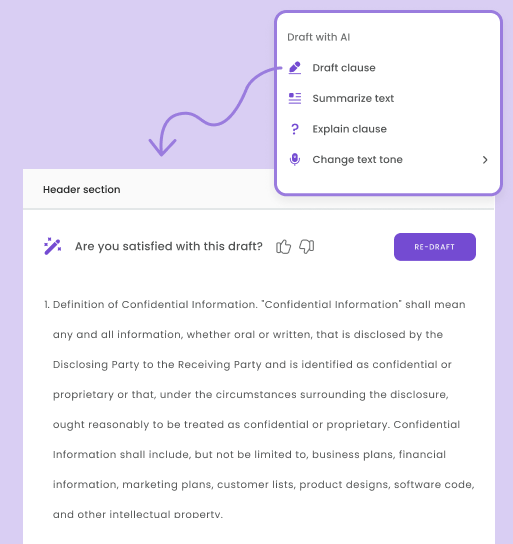When people start companies, they often consider their exit and succession strategies.
This is especially true when there are multiple owners in an organization.
One way that people try to solve this problem is by using what’s known as a buyout agreement. It often protects the interests of other parties when there is a force majeure event or when someone decides to step away from the business.
In this guide, you’ll learn what a buyout agreement is, its major components, the different benefits it can bring to the table, and more.
Let’s get started.
Understanding Buyout Agreements
A buyout agreement, also known as a buy-sell agreement, is a legal document that outlines the terms and conditions under which a business owner’s interest in a company can be bought or sold.
The primary purpose of a buyout agreement is to provide a mechanism for the orderly transition of ownership in the event of certain triggering events, such as the death, disability, retirement, or voluntary departure of a business owner.
The buyout agreement becomes essential when a business has multiple partners and someone leaves or the owner passes away without any other succession plans. It’s easy for disputes and confusion to arise.
This agreement helps avoid potential disputes and uncertainties by establishing a predetermined process for the transfer of ownership and the valuation of the business.
Types of Buy-Sell Agreements:
- Cross-Purchase Agreement: In this type of agreement, each business owner agrees to buy the ownership interest of a departing owner. It’s most common in partnerships or organizations with few owners.
The departing owner’s interest is typically proportionally divided among the remaining owners based on their existing ownership percentages. Cross-purchase agreements are often funded through life insurance policies, providing a source of liquidity to facilitate the buyout. Of course, they can also be funded out of pocket by the other partners or owners of the business.
- Entity Purchase Agreement: Also known as a stock redemption agreement in a corporation, is when the business purchases the departing owner’s interest.
In this scenario, the business entity is responsible for buying and retiring the shares or ownership interest. This type of agreement is commonly used in corporations. The funding for the buyout may come from corporate funds, reserves, or insurance on the lives of the owners. The shares may not be retired. They can also be redistributed, added to a pool for bonuses or employees, etc.
- Wait-and-See Agreement: A wait-and-see agreement combines elements of both cross-purchase and entity purchase agreements, providing flexibility based on the circumstances at the time of the triggering event.
This agreement provides optionality to the remaining owners. They decide whether they will individually purchase the departing owner’s interest (cross-purchase) or if the business entity will do so (entity purchase). The decision is typically influenced by factors such as taxation, financing availability, and the number of remaining owners.
Buyout agreements are important in providing a structured and organized process for the transfer of ownership in a business. It prevents chaos and disputes.
The choice between cross-purchase, entity purchase, or wait-and-see agreements depends on factors such as the business structure, the number of owners, and the desired level of flexibility in handling ownership transitions.
Key Components of Buyout Agreements
There are many parts of a buyout agreement that need to be considered. It’s not as easy as saying that when so and so person retires, we’ll purchase their shares for X amount.
There are multiple potential triggering events, different ways to value the business (and their share value), and even considering how the purchase will be funded.
Triggering Events
There are many reasons why a buyout agreement may take place. Some of these things, known as triggering events, are expected and should be planned for. Some of them are unexpected and may not be easy to plan for.
- Death of a Partner/Shareholder: Specify how the business will handle the transfer of ownership if a partner or owner dies. It outlines the obligations of the remaining owners or the business entity to purchase the deceased owner’s interest and the mechanism for determining the purchase price. A price is not usually set at this price because it may be too high or too low to properly reflect the value of the asset.
- Retirement: The buyout agreement should address the conditions and terms under which an owner can retire and sell their interest in the business. This includes defining the criteria for retirement, the timing of the buyout, and the method of valuation for the retiring owner’s share.
- Disability: In the case of an owner becoming disabled and unable to actively participate in the business, the buyout agreement should specify the process for the buyout of their interest. This may involve determining the disability criteria, the valuation method, and the funding mechanism for the buyout. Keep in mind that disability is not always a valid triggering mechanism. For owners with shares, they may lose their position but not their ownership rights.
- Divorce: The potential impact of divorce on business ownership can be significant. The buyout agreement should address how the ownership interest will be handled during divorce. This ensures the business remains stable and unaffected by personal legal proceedings. For example, any shares awarded to an uninvolved spouse are immediately purchased by the company at a discounted or marked up rate.
- Disagreements or Dissolution: The agreement should outline the procedures for handling disputes among owners that could lead to the dissolution of the business. It may include provisions for a buyout when there are irreconcilable disagreements.
Valuation Methods:
- Appraisal Process: The buyout agreement should specify the process for appraising the value of the business. This may involve hiring a professional appraiser to determine the fair market value based on financial statements, assets, and other relevant factors.
- Formula-Based Valuation: Some agreements use predefined formulas, such as a multiple of earnings or a percentage of book value, to determine the value of the ownership interest. This provides a more straightforward and predetermined method for valuation.
- Fixed Price: In certain cases, the buyout agreement may establish a fixed or predetermined price for the ownership interest. This approach simplifies the valuation process but requires periodic reviews and adjustments to account for changes in the business’s financial performance. If the burden of a regular review (at least yearly) is too much then it’s best to go with one of the other valuation methods.
Funding the Buyout:
There are multiple ways to fund the buyout and these can be stipulated in the buyout agreement as well. Oftentimes, third-party sources are used to purchase the ownership interest and then they are dealt with according to the agreement.
- Cash Reserves: Businesses may set aside cash reserves to fund potential buyouts. This approach provides liquidity for the purchase of an owner’s interest without relying on external financing.
- Installment Payments: The buyout agreement may allow for installment payments over time, providing a structured way for the remaining owners or the business entity to buy out the departing owner. This method can ease the financial burden on the buying party and provide a steady stream of income to the heirs or recipients of the proceeds.
- Life Insurance: Life insurance is a common funding mechanism for buyouts, especially in the case of the death of an owner. The business takes out life insurance policies on each owner, and the death benefit is used to fund the buyout, ensuring a quick and efficient transfer of ownership.
Buyout agreements should comprehensively address triggering events, valuation methods, and funding mechanisms to provide clarity, fairness, and a smooth transition of ownership. These key components contribute to the stability and continuity of the business by mitigating potential conflicts and uncertainties.
Benefits of Buyout Agreements
There are many benefits associated with buyout agreements. Many of them are obvious but some are more subtle and may not be apparent on the surface. Below are a few of the more practical and immediate benefits of having buyout agreements in place.
Ensures Business Continuity:
One of the primary benefits of a buyout agreement is its role in ensuring the continuity of the business in the face of unforeseen events. Events such as the death, disability, retirement, or departure of a partner or shareholder can disrupt the normal operations of a business.
A well-crafted buyout agreement provides a predetermined and orderly process for the transfer of ownership, allowing the business to continue functioning smoothly without major disruptions. This stability is crucial for maintaining customer relationships, sustaining operations, and preserving the value of the business.
Provides Financial Security for Partners/Shareholders:
Buyout agreements offer financial security for partners or shareholders by establishing a mechanism for the fair and timely buyout of their ownership interest. With triggering events like death or retirement, the departing owner or their beneficiaries receive a predetermined and equitable value for their share of the business. This financial security is particularly important for the families of deceased owners, ensuring they receive fair compensation.
Minimizes Disputes and Litigation:
The agreement provides a framework for addressing disagreements, preventing ambiguity, and reducing the risk of conflicts among owners. This proactive approach to dispute resolution contributes to a healthier and more stable business environment, preserving relationships and maintaining focus on the core operations of the business rather than legal battles.
Protects Business Interests in Divorce Cases:
In cases where an owner goes through a divorce, a buyout agreement can protect the business from potential disruptions. By specifying how the ownership interest will be handled in the event of divorce, the agreement helps prevent the ex-spouse from gaining control or ownership shares in the business, safeguarding the business’s integrity and continuity.
Buyout agreements offer numerous benefits for business owners, including ensuring business continuity, providing financial security, minimizing disputes, and facilitating smooth ownership transitions. By addressing these key aspects, buyout agreements contribute to the overall stability and success of a business.
Challenges and Considerations of a buyout agreement
Adapting to Changing Business Conditions:
- Dynamic Business Environment: The business environment is constantly changing, including shifts in market conditions, economic trends, and industry dynamics. A challenge in buyout agreements is ensuring that the terms and conditions remain relevant and adaptable to these changes. It may be best to be vague in certain areas like the specific price and only provide formulas or guidelines. This will give you the flexibility to adapt to changing circumstances.
- Valuation Challenges: The valuation methods specified in the agreement may need adjustment over time to accurately reflect the current value of the business. Failure to update valuation mechanisms can lead to disputes and inequitable buyout arrangements.
Communication and Cooperation Among Partners:
- Open Communication: Successful buyout agreements rely on open and transparent communication among partners. Challenges may arise if there is a lack of communication or if partners fail to discuss and agree upon the terms of the agreement.
- Cooperation During Triggering Events: In the midst of triggering events such as death, disability, or disagreements, emotions and tensions can run high. The ability of partners to cooperate and adhere to the terms of the agreement is crucial for its effective implementation.
Regular Review and Updates:
- Changing Circumstances: The business landscape and ownership structure may evolve over time. Regular review and updates of the buyout agreement are necessary to ensure that it aligns with the current circumstances and goals of the business and its owners.
- Legal and Tax Considerations: Laws and tax regulations may change, affecting the legality and tax implications of buyout agreements. Regular legal reviews are essential to ensure compliance with current regulations and to optimize the agreement’s tax efficiency.
Financing Challenges:
- Availability of Funding: Funding the buyout, especially in the absence of sufficient cash reserves, can pose challenges. Partners may face difficulties securing financing, and the terms of financing can impact the overall financial health of the business.
- Impact on Business Operations: The financial strain of a buyout, whether through installment payments or other means, may impact the day-to-day operations of the business. Balancing the financial needs of the business with the financial requirements of the buyout is a critical consideration.
Legal and Regulatory Compliance:
- Legal Changes: Legal requirements and regulations governing business transactions can change, affecting the enforceability and validity of buyout agreements. Regular legal reviews are essential to ensure ongoing compliance with applicable laws.
- Documentation Accuracy: The agreement must be carefully drafted and executed to avoid ambiguity or loopholes that could lead to legal challenges. Legal expertise is crucial in creating a robust and enforceable buyout agreement.
Managing Expectations:
- Differing Objectives: Partners may have divergent expectations regarding the value of the business, triggering events, or the buyout process. Aligning these expectations and ensuring mutual understanding is a continual challenge. A good way to deal with this is to have regular, open, and candid discussions of about potential buyouts.
- Contingency Planning: Anticipating potential scenarios and planning for contingencies, especially in complex business structures, requires careful consideration to avoid unforeseen challenges during a buyout.
Buyout agreements present various challenges, including adapting to changing business conditions, fostering communication and cooperation among partners, and the necessity for regular reviews and updates. Addressing these challenges requires ongoing attention, communication, and a proactive approach to ensure the effectiveness and relevance of the agreement over time.
Conclusion
Buyout agreements are powerful tools in the succession planning process for businesses of all sizes. They can protect your interests when there’s a death, retirement, or other situation.
There are many ways to set them up and value the business and it’ll be up to you to determine the best approach for your situation. This guide has covered the major things you need to know.
If you don’t have a buyout agreement in place then start talking with your partners now and set the groundwork to create one. There are way more benefits than cons.
Let me know what you think in the comments and don’t forget to share.




